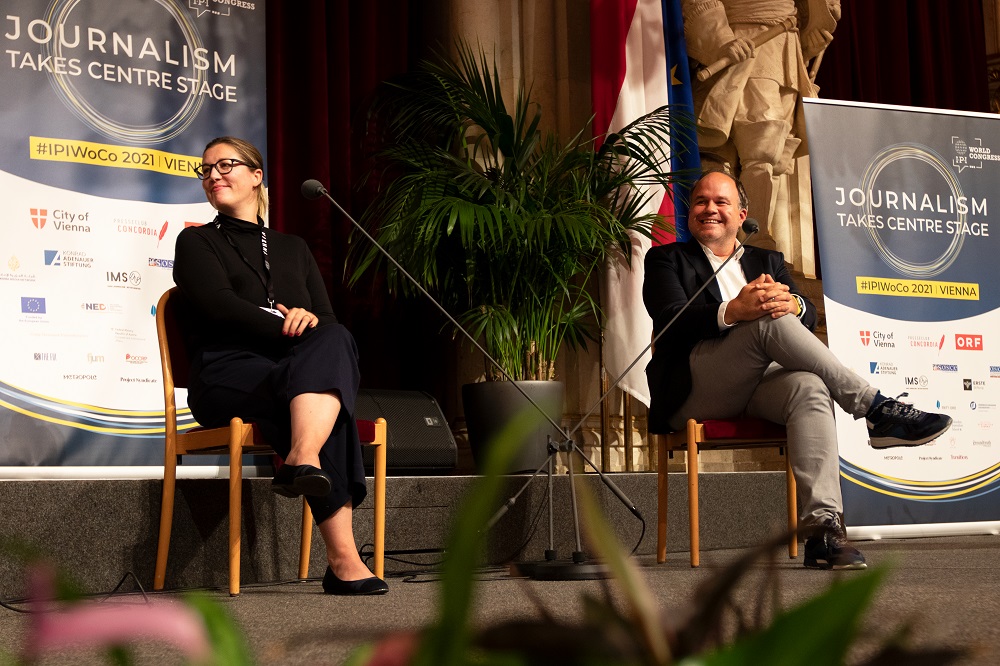During the closing discussion at IPI’s World Congress on Friday, September 17, panelists agreed that in today’s world, newsrooms need to seek innovative ways to fund their work. The session “How fund the journalism we need” was organized in partnership with Vienna’s Presseclub Concordia.
Anita Zielina, director of news innovation and leadership at the Craig Newmark Graduate School of Journalism at the City University of New York in the U.S., said a diversified revenue portfolio is the key to newsroom success.
“If you just have one revenue source, that makes it very easy for the person or the organization, or whoever is behind that revenue source, to try to influence your journalism,” Zielina said.
In the U.S., Zielina said, the media organizations that have a combination of funding from readers, subscriptions, advertising, public money, and philanthropic support are faring better than those who focus on one form of funding.
Wir haben die Ehre, das letzte Panel am #IPIWoCo zu hosten. Mit @Frau_Kraus sprechen Florian Skrabal (@dossier_), @KaltenbrunnerA, @Zielina, @gerold_rie und @mark_dekan über “New ways to fund good journalism”. pic.twitter.com/7QC92ul25q
— Presseclub Concordia (@PCConcordia) September 17, 2021
Gerold Riedmann, managing director of Russmedia in Austria, said most Austrian newsrooms are dependent on their print revenues, putting them in a dangerous and dependent position. He pointed out how successful newsrooms have expanded beyond journalism to events and other areas that newsrooms haven’t traditionally included.
Florian Skrabal, editor-in-chief of DOSSIER, an Austrian investigative news outlet, explained his newsroom’s innovative business model.
“We have 6,000 members now paying roughly 60 euros per person, and 80 percent of that goes to our payrolls,” Skrabal said. “We have six employees earning the same amount. It’s a very democratic system. I get the same payment as my colleagues.”
Uniquely, Skrabal said, DOSSIER decided to refuse any advertising money, which many thought was a mistake at first. It worked out — after introducing a paywall, the team was able to expand from digital-only content to a printed magazine.
“Will I be a rich man? Probably not. But I will be a happy man, doing what I love most: journalism.”
Bescheidene Freude von @dossier_-CR Florian Skrabal, dessen Team sich unlängst über eine Crowdfunding-Kampagne ein Jahr ihrer journalistischen Arbeit finanziert hat. #IPIWoCo pic.twitter.com/tU4GQz8Fsm
— Presseclub Concordia (@PCConcordia) September 17, 2021
Mark Dekan, CEO of Ringier Axel Springer, said it’s harder for newsrooms in Central and Eastern Europe to have independence due to weakening democratic structures in the regions.
“This has led to the sale of a couple of very influential titles to owners who do not pursue media as a business”, Dekan said. “They would like to gain influence, they would like to have power.”
To counter this, Dekan said, there must be a strong European Union.
“We need some kind of regulatory move in order to change this hostile environment, which is increasing at the moment”, Dekan said.
Ultimately, the panelists agreed that readers must be able to trust their newsrooms — which means that newsrooms must be transparent about where their funding is coming from and about their mistakes.
“There needs to be more responsibility with media corporations to reveal their missions, to make their operations or their journalism more transparent, and to establish a better culture of admitting to mistakes”, Skrabal said.



